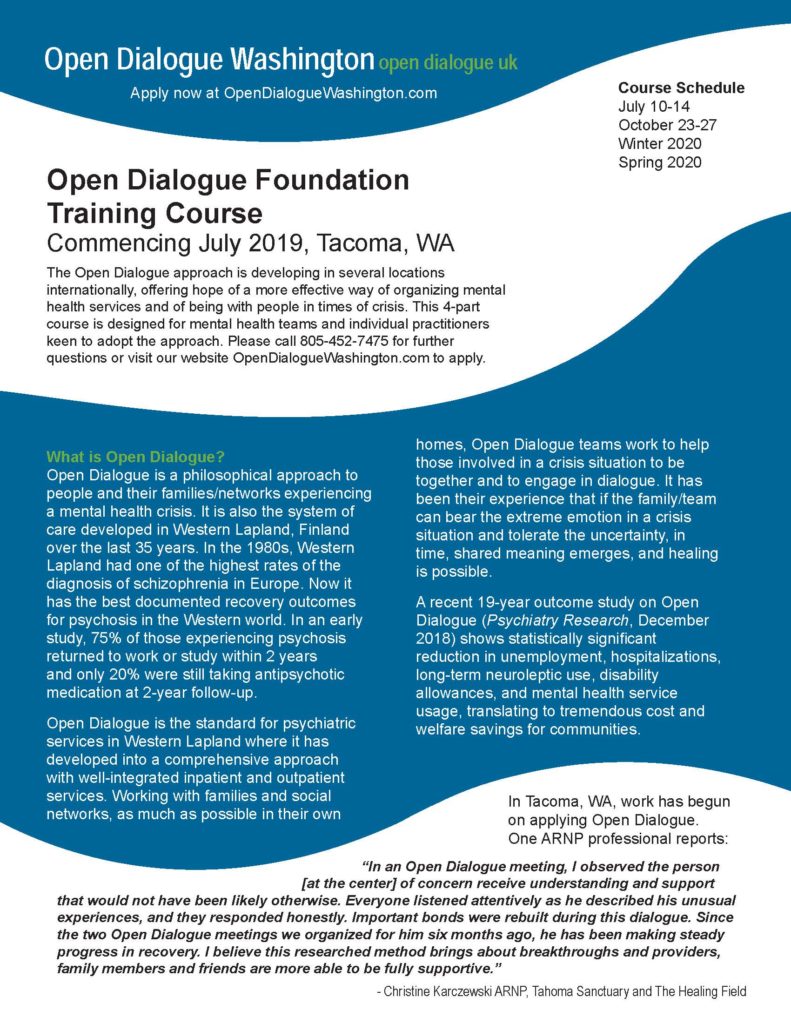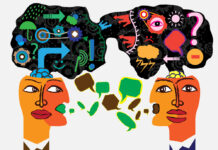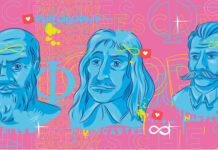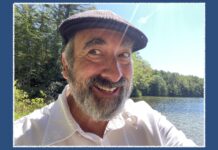This week on MIA Radio, we turn our attention to Open Dialogue and we chat with psychotherapist and Open Dialogue trainer Alita Taylor. Alita is a licensed Marriage & Family Therapist, trainer and facilitator based in Tacoma, Washington USA. Her passion is working from a community-based, non-expert, need-adapted Open Dialogue perspective, which utilizes social networks, family, and co-facilitation with other professionals.
In this recent blog, Alita shares why Open Dialogue ‘cannot be taught, but needs a teacher‘.
Love Is In the Air…
I am in love. I’m in love with this way of working. And I won’t stop. Open Dialogue Washington began in 2018 upon my graduation/commencement from Jaakko Seikkula’s dialogic approaches to couple and family therapy trainer/supervisor training, in collaboration with Dialogic Partners and the University of Jyväskylä.
In 2016, I embarked to partake in the best training course I had ever experienced as a family therapist. The embodiment I experienced working with my Open Dialogue colleagues felt like the missing key in psychiatry and psychotherapy. Something intangible, yet what I knew all along. Something ineffable, yet also a shared language. Something deeply and autonomically human, yet unrepeatable and fleeting. It led me onto a moment-by-moment path where everything I learned in my 27-year long career about systemic family therapy and emergency psychiatric protocols ebbed, and the present moment of love flowed, neither the ebbing knowledge nor the cresting wisdom having any lesser value than the other. The complete work we do in mental health care is this ocean of love.
We are in constant change when we are in crisis. Timelessness sets in. Growth is happening. We don’t exactly know what we need. That is what mental health work is, sitting with this human happening. In the in-between space, something happens, and we don’t know what will. This is the paradox. We are navigating the ebb and flow of incoming knowledge we have from research and the ebb and flow in each patient and family’s difficulties (the meanings they make of them).
“It cannot be taught, but it needs a teacher.”
After getting trained to facilitate and supervise Open Dialogue, I found that this is the crux of the work, holding more than one truth. As human beings, as a society, as mental health practitioners, we must be able to ask what is helpful, and we must be willing to co-provide this “help” creatively, without barriers, between the digitized rows and columns of tick-boxes and presumptive diagnostic menus. Remember the analog world of dials and infinite decimals? Agency lies within ourselves to expand the possibilities, to be willing to open to solutions that have not yet been tried.
Michael Pohl wrote about dialogical leadership and culture in which he referenced Karl-Martin Dietz and Thomas Kracht of the Hardenberg Institute for Cultural Studies in Heidelberg, Germany. Michael remembered a discussion on whether dialogism can be taught or experienced. It was argued that the dialogic attitude cannot be learned and that any thought of teaching it is unnecessary. Michael disagreed. He writes, “It cannot be taught, but it needs a teacher.”— Medium.com, March 2018.
In Helsinki and Tornio while learning the Open Dialogue approach, I had many teachers: Jorma Ahonen, Pekka Borchers, Birgitta Alakare, Aino Maija Rautkallio, Kari Valtanen, Tom Erik Arnkil, Jaakko Seikkula, Tapio Salo, Tanja Pihlaja, Eija-Liisa Rautiainen, Pekka Holm. How did they do it? To quote Birgitta Alakare when she was asked about the beginnings of the development of Open Dialogue in the 1980’s, “It was not only me, it was all of us, everyone.”
When we include all the stakeholders, all the voices, polyphonically, something extraordinary is given space to emerge. This is challenging to enact when there are systems of health care based on bed occupancy, lengths of stay, productivity, staff ratios, definitions of “emergency” or “inpatient” levels of care.
Well, Open Dialogue Washington is bringing to the fore the question, “What is our role as helpers??” To quote Mia Kurtti, Open Dialogue trainer of Tornio, Finland, “What are we really doing here?”
Caring for our mental health, however defined (crises, hard times, depression, psychosis), is a human need that varies from moment to moment. I learn from every client and family I sit with. In Open Dialogue, multiple perspectives are allowed, in fact invited. Unusual experiences are uncategorized mystery, and understanding between client and family/social network is continuously underway. The course of schizophrenia was reversed in Western Lapland, and their inhabitants trust their mental health system. Hmmm… if we want to save State and Federal dollars and our own livelihoods, perhaps we should allow ourselves to practice psychotherapy and psychiatry with more questions than answers. Perhaps the ones in crisis will teach us what we didn’t know. Love is somewhere, here, in the air.
















Thanks James and Alita,
It sounds like the exact opposite to the (lunatic) Official Approach (and that’s why it works).
(Recovery from “schizophrenia” IMO can be scientifically seen in the economics of the outcome).
Report comment
To the Author – let the student be the teacher . . . something I practiced while teaching political science while filling in for the Professor. It only takes one phrase, one unanswered question, to lift the conversation to a whole new level, bring a whole new level of understanding.
Fiachra – may I use your “economics of the outcome” statement?
Report comment
Yes you can, ds_ghoste.
Report comment
When a young person gets injured in a sporting accident the treatment might involve “pain killers”, resetting the injury, and maybe some rehabilitation – which is likely to cost a limited investment at the time.
When a young person has a “breakdown” they need the same type of investment in the sense of putting things right. BUT what’s on offer in this situation is “painkillers” and a lifelong disability check (with an eventual cost of $$ millions).
Report comment
Nicely said Alita! This is exactly how I worked at Soteria House before ever going to grad school or getting my Marriage and family counseling license. I loved learning about OD as it’s the essence of truly “being with” someone that opens the space for discovery. I keep experiencing the harmony between the Soteria model and Ooen Dialogue. Working to bring these together Hopefully someday!
Report comment